#RECYCLING
Explore tagged Tumblr posts
Text
The non-toxic, environmentally friendly, solvent-free process first uses an inexpensive catalyst to break apart the bonds in polyethylene terephthalate (PET), the most common plastic in the polyester family. Then, the researchers merely expose the broken pieces to ambient air. Leveraging the trace amounts of moisture in air, the broken-down PET is converted into monomers—the crucial building blocks for plastics. From there, the researchers envision the monomers could be recycled into new PET products or other, more valuable materials. Safer, cleaner, cheaper and more sustainable than current plastic recycling methods, the new technique offers a promising path toward creating a circular economy for plastics. The study was recently published in Green Chemistry.
Continue Reading.
431 notes
·
View notes
Text
I'm gonna say a lil bit about asphalt here: It's one of the most recycled materials in the US, (I think this is true globally but I'm just going off my most recent reading) because the tar in it can be melted down, and it can be re-applied. According to Wikipedia, less than 1% of removed asphalt ends up in landfills. It can be recycled on site because additional tar can be added to the removed stuff it in a heated mixer, and any rubble or extra material in the old asphalt just becomes part of the aggregate. The tools to lay virgin asphalt are the same to recycle it.
It's also kind of genius stuff, because it's not entirely a solid. The tar/bitumen in it is a very very viscous and slow-moving liquid. This actually makes it a lot less brittle and more durable than some other construction materials. This is why you might see a road with deep tire grooves in it before potholes even happened. A cobblestone or concrete road, supporting the heavy vehicles we have today, would break down much faster and require a lot more work and new material to repair. (Concrete is more brittle, not as fully recyclable and new concrete won't bond to old concrete. It would also be more prone to fracturing from temperature changes in areas that freeze in the winter.)
So yeah, don't blame engineers and asphalt for potholes. As usual, blame billionaires.

#asphalt#recycling#not saying it's perfect but#roads#capitalism#late stage capitalism#taxes#billionaires#US infrastructure
967 notes
·
View notes
Text
Gothic is always being reinvented — undone, redone, repurposed, reconstituted, recycled — and yet, somehow, it is always still recognizable.
—Gothic Mash-Ups

#natalie neill#severance 2.10#reinvention#repurposing#recycling#mash up#innocence#gothic horror#period fashion#cw blood#lorne#gwendoline christie#mammalians nurturable#baby goats#gothic#severance#severance spoilers
23 notes
·
View notes
Text
A company making wooden wind turbine blades has successfully tested a 50-meter-long prototype that’s set to debut soon in the Indian and European markets.
Last year, the German firm Voodin successfully demonstrated that their laminated-veneer timber blades could be fabricated, adapted, and installed at a lower cost than existing blades, while maintaining performance.
Now, Voodin has announced a partnership with the Indian wind company Senvion to supply its 4.2-megawatt turbines with these wooden blades for another trial run.
Wind power has accumulated more than a few demerit points for several shortfalls in the overall industry of this fossil-fuel alternative.
Some of these, such as the impact on bird life, are justified, but none more so than the fact that the turbine blades are impossible or nearly impossible to recycle, and that they need to be changed every 25 years.
Wind turbine blades are made from a mixture of glass and carbon fiber heated together with sticky epoxy resin, and these materials can’t be separated once combined, which means they go into landfills or are incinerated when they become too battered to safely operate.
GNN has reported that folks will occasionally find second-life value in these giant panels, for example in Denmark where they are turned into bike shelters. In another instance, they’re being used as pedestrian bridges.
But there are way more wind turbine blades being made every year than pedestrian bridges and bike shelters, making the overall environmental impact of wind power not all green.
“At the end of their lifecycle, most blades are buried in the ground or incinerated. This means that—at this pace—we will end up with 50 million tonnes of blade material waste by 2050,” Voodin Blade Technology’s CEO. Mr. Siekmann said recently. “With our solution, we want to help green energy truly become as green as possible.”
The last 15 years have seen rapid growth in another industry called mass timber. This state-of-the-art manufacturing technique sees panels of lumber heat-pressed, cross-laminated, and glued into a finished product that’s being used to make skyscrapers, airports, and more.
At the end of the day though, mass timber products are still wood, and can be recycled in a variety of ways.
“The blades are not only an innovative technological advancement but a significant leap toward sustainable wind production,” said Siekmann, adding that this isn’t a case of pay more to waste less; the blades cost around 20% less than carbon fiber.
Additionally, the added flexibility of wooden blades should allow for taller towers and longer blades, potentially boosting the output of turbine by accessing higher wind speeds.
Now partnered with Voodin, Senvion will begin feasibility analysis in the next few months, before official testing begins around 2027.
#good news#wind turbines#wind power#environmentalism#science#environment#fossil fuel alternatives#mass timber#recycling
8K notes
·
View notes
Photo
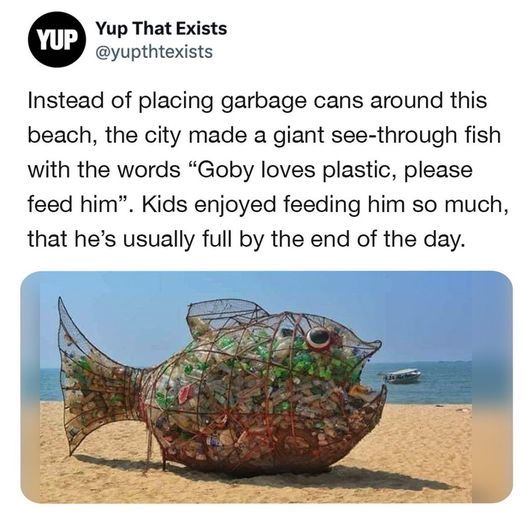
147K notes
·
View notes
Photo

The 7 R’s of Sustainability:
Did you know that ‘recycling’ is step 6 of the 7 Rs of sustainability? The other R’s are just as important even if they are often forgotten.
Rethink- Do I really need to buy this? The point of this step is to stop and think.
Refuse- Does this product damage the environment? If so, refuse to spend your money on it. i.e. single use plastics, harsh chemicals
Reduce- How much of this do I really need? Buy less! Buy in bulk when you can as it often equals less packaging to throw out.
Reuse- Can I use this product again? Can I fix what I have so that I don’t need to buy something new? Reuse that plastic water bottle a few times. And instead of buying new, try thrift shopping, flea markets, yard sales etc.
Repurpose- Unlimited creativity! Does this item have another use? i.e. old torn clothes can be rags or plastic cups can be planters.
Recycle- Can I recycle this? Not everything can be. There are also some important steps to making sure your recycling is done properly. If unsure, look up local recycling regulations.
Rot- Can I compost this? Food waste, yard clippings, newspapers and many other items can be composted instead of being tossed in the trash. Composting is surprisingly simple and helps reduce harmful greenhouse gasses from entering the atmosphere.
What is the point of the R’s? The number one benefit of the 7 R’s are the reduction of the amount of waste sent to incinerators and landfills. The EPA website provides a lot of useful information. Other benefits that we can reap from implementing these concepts in our life are (as listed on the EPA website): • Prevents pollution caused by reducing the need to harvest new raw materials • Saves energy from not making a new product • Reduces greenhouse gas emissions that contribute to climate change • Helps sustain the environment and natural resources for future generations • Saves money from processing our waste • Increases economic security by tapping a domestic source of materials • Helps create jobs in the recycling and manufacturing industries in the United States
https://www.northglenn.org/government/departments/public_works/trash/recycling.php https://www.nrdc.org/stories/composting-101 https://www.epa.gov/recycle https://www.northglenn.org/Recycling%20Article.pdf
6K notes
·
View notes
Text
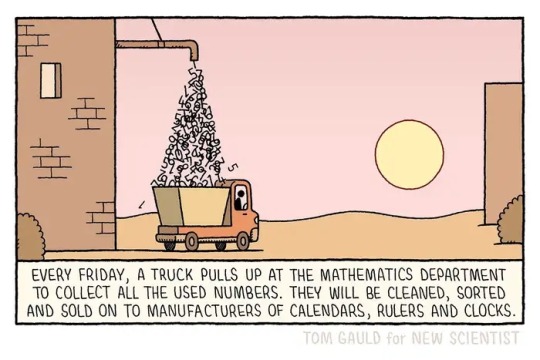
My latest cartoon for New Scientist
9K notes
·
View notes
Text
I made some solarpunk soda tab jewelry!! Again. And I'm making more. (Image ID at the bottom of he post)


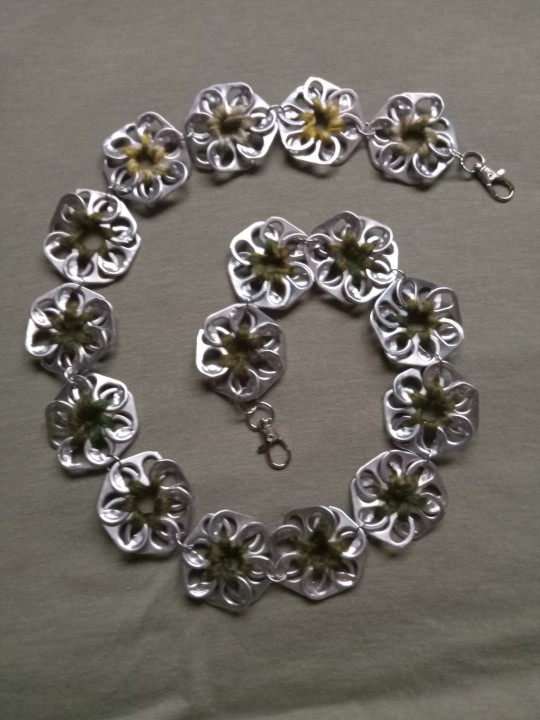

A choker, a pair of earrings, a belt/waist chain and some bracelets using 100% thrifted/recycled materials! The choker and the bracelets have two layers so that the sharp aluminum edges on the back of the tabs aren't making contact with skin, you can kinda see it in the pictures. Here are more pictures:
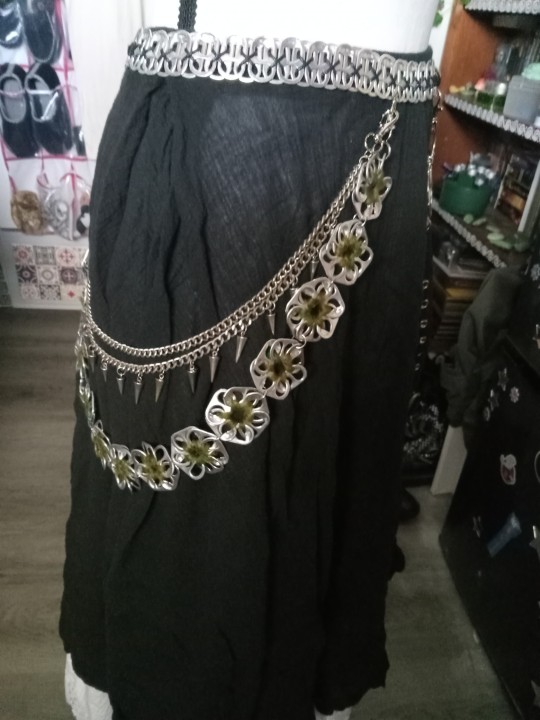


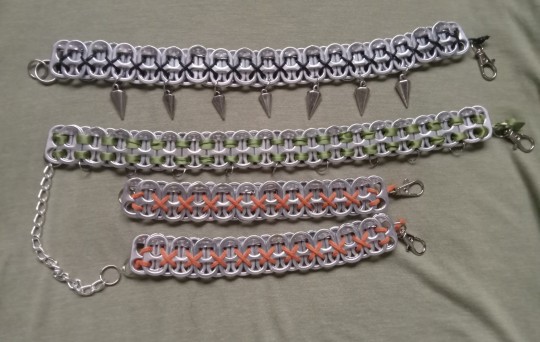
[Image ID: 8 images. The first one shows a choker made out of soda tabs, with black cord weaved through it forming x shapes. There's a silver spike charm hanging from every other tab about an inch apart from each other. Im in the picture wearing the choker, my face is not in frame but my pale as fuck neck is visible and so is my dark brown hair.
The second image shows a pair of clip-on earrings laying on a sage green background. Each earring is made of 6 soda tabs weaved into a flower shape with green yarn, and three dangles hanging from the bottom. The dangles are made of a wire link with a black bead on in and a silver spike charm hanging from that. The same spike charms I used for the choker.
The third image shows a 2 ft 7 inch long belt chain made of the soda tab flowers from the earring image. Each flower is made of six tabs weaved together with the same green yarn but they yarn fades to yellow towards the end of the chain. 16 soda tab flowers are linked together with large jump rings and there are large silver clasps on each end to attach to a belt.
The forth image is my hand wearing a black compression brace and two soda tab bracelets. They are weaved together the same way as the choker, with the cord forming x shapes, but the cord is orange and not black. The bracelets are the same size, 8 inches long when laying flat including the clasp. There are two layers of soda tabs which makes the bracelet a little thicker.
The next 2 images shows a dress form wearing the belt chain from two different angles. It had a black skirt with a soda tab belt, with various spikey chains hanging from it. There's a black strip of grommet tape hanging on the right side of the belt and my soda tab flower belt chain hanging on the left side.
The next image shows one of the bracelets at and angle so the double layers are visible, and the last image shows the bracelets, the choker, and an unfinished soda tab choker with green ribbon weaved through it all laying flat on a sage green background. End ID]
#solarpunk#punk#solarpunk fashion#solarpunk diy#punk diy#punk fashion#fashion#diy#jewelry#upcycled jewelry#jewelry making#handmade jewelry#hatchet makes stuff#punk jewelry#solarpunk aesthetic#hopepunk#ecopunk#recycling#sustainable fashion#sustainability#soda tabs#pop tabs#tabistry#art#crafting#goth diy#goth jewelry#goth#goth fashion#described
1K notes
·
View notes
Text
The aluminium from the cans was very sharp so I had to be careful not to get a cut, but other than that it was pretty easy
Tiktok i just found with a hack on using the bottoms of old cans as the base for diy buttons. Make sure to cover the sharp edge with something!
#ive started using tiktok again as a lil treat#god its embarrassing when my ass comes on here and is like GUYS LOOK AT MY TIKTOKS#punk#diy#diy pins#buttons#pins#diy buttons#recycling#upcycling#accessories#handmade#diy punk#punk diy#diy or die
2K notes
·
View notes
Text
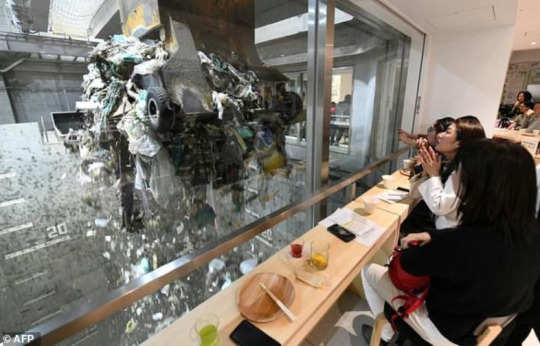
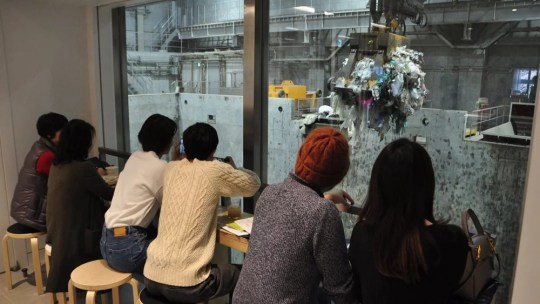
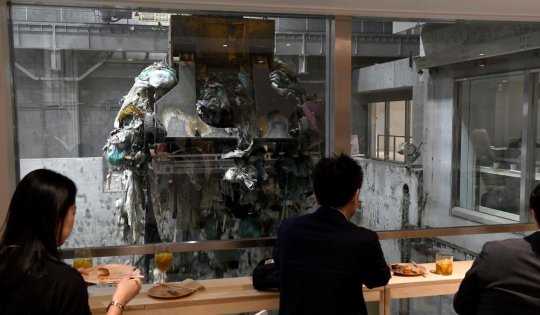
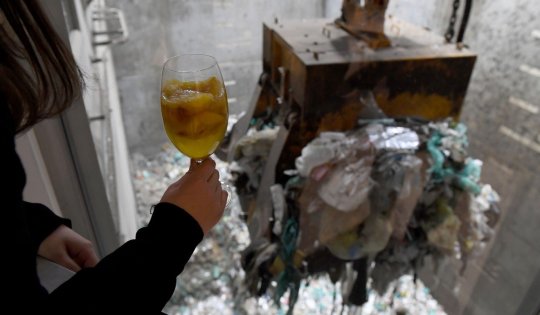
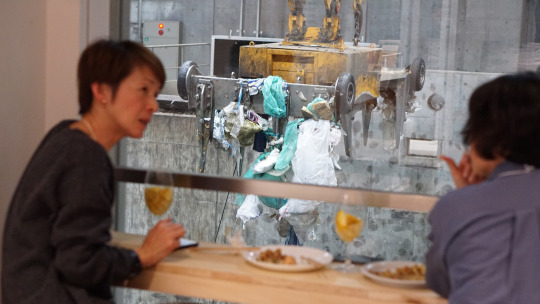

Gomi Pit
2K notes
·
View notes
Text
Good News - July 22-28
Like these weekly compilations? Tip me at $kaybarr1735 or check out my new(ly repurposed) Patreon!
1. Four new cheetah cubs born in Saudi Arabia after 40 years of extinction

“[T]he discovery of mummified cheetahs in caves […] which ranged in age from 4,000 to as recent as 120 years, proved that the animals […] once called [Saudi Arabia] home. The realisation kick-started the country’s Cheetah Conservation Program to bring back the cats to their historic Arabian range. […] Dr Mohammed Qurban, CEO of the NCW, said: […] “This motivates us to continue our efforts to restore and reintroduce cheetahs, guided by an integrated strategy designed in accordance with best international practices.””
2. In sub-Saharan Africa, ‘forgotten’ foods could boost climate resilience, nutrition

“[A study published in PNAS] examined “forgotten” crops that may help make sub-Saharan food systems more resilient, and more nutritious, as climate change makes it harder to grow [current staple crops.] [… The study identified 138 indigenous] food crops that were “relatively underresearched, underutilized, or underpromoted in an African context,” but which have the nutrient content and growing stability to support healthy diets and local economies in the region. […] In Eswatini, van Zonneveld and the World Vegetable Center are working with schools to introduce hardy, underutilized vegetables to their gardens, which have typically only grown beans and maize.”
3. Here's how $4 billion in government money is being spent to reduce climate pollution

“[New Orleans was awarded] nearly $50 million to help pay for installing solar on low to middle income homes [… and] plans to green up underserved areas with trees and build out its lackluster bike lane system to provide an alternative to cars. […] In Utah, $75 million will fund several measures from expanding electric vehicles to reducing methane emissions from oil and gas production. [… A] coalition of states led by North Carolina will look to store carbon in lands used for agriculture as well as natural places like wetlands, with more than $400 million. [… This funding is] “providing investments in communities, new jobs, cost savings for everyday Americans, improved air quality, … better health outcomes.””
4. From doom scrolling to hope scrolling: this week’s big Democratic vibe shift

“[Democrats] have been on an emotional rollercoaster for the past few weeks: from grim determination as Biden fought to hang on to his push for a second term, to outright exuberance after he stepped aside and Harris launched her campaign. […] In less than a week, the Harris campaign raised record-breaking sums and signed up more than 100,000 new volunteers[….] This honeymoon phase will end, said Democratic strategist Guy Cecil, warning the election will be a close race, despite this newfound exuberance in his party. [… But v]oters are saying they are excited to vote for Harris and not just against Trump. That’s new.”
5. Biodegradable luminescent polymers show promise for reducing electronic waste

“[A team of scientists discovered that a certain] chemical enables the recycling of [luminescent polymers] while maintaining high light-emitting functions. […] At the end of life, this new polymer can be degraded under either mild acidic conditions (near the pH of stomach acid) or relatively low heat treatment (> 410 F). The resulting materials can be isolated and remade into new materials for future applications. […] The researchers predict this new polymer can be applied to existing technologies, such as displays and medical imaging, and enable new applications […] such as cell phones and computer screens with continued testing.”
6. World’s Biggest Dam Removal Project to Open 420 Miles of Salmon Habitat this Fall

“Reconnecting the river will help salmon and steelhead populations survive a warming climate and [natural disasters….] In the long term, dam removal will significantly improve water quality in the Klamath. “Algae problems in the reservoirs behind the dams were so bad that the water was dangerous for contact […] and not drinkable,” says Fluvial Geomorphologist Brian Cluer. [… The project] will begin to reverse decades of habitat degradation, allow threatened salmon species to be resilient in the face of climate change, and restore tribal connections to their traditional food source.”
7. Biden-Harris Administration Awards $45.1 Million to Expand Mental Health and Substance Use Services Across the Lifespan
““Be it fostering wellness in young people, caring for the unhoused, facilitating treatment and more, this funding directly supports the needs of our neighbors,” said HHS Secretary Xavier Becerra. [The funding also supports] recovery and reentry services to adults in the criminal justice system who have a substance use disorder[… and clinics which] serve anyone who asks for help for mental health or substance use, regardless of their ability to pay.”
8. The World’s Rarest Crow Will Soon Fly Free on Maui

“[… In] the latest attempt to establish a wild crow population, biologists will investigate if this species can thrive on Maui, an island where it may have never lived before. Translocations outside of a species’ known historical range are rare in conservation work, but for a bird on the brink of extinction, it’s a necessary experiment: Scientists believe the crows will be safer from predators in a new locale—a main reason that past reintroduction attempts failed. […] As the release date approaches, the crows have already undergone extensive preparation for life in the wild. […] “We try to give them the respect that you would give if you were caring for someone’s elder.””
9. An optimist’s guide to the EV battery mining challenge
““Battery minerals have a tremendous benefit over oil, and that’s that you can reuse them.” [… T]he report’s authors found there’s evidence to suggest that [improvements in technology] and recycling have already helped limit demand for battery minerals in spite of this rapid growth — and that further improvements can reduce it even more. [… They] envision a scenario in which new mining for battery materials can basically stop by 2050, as battery recycling meets demand. In this fully realized circular battery economy, the world must extract a total of 125 million tons of battery minerals — a sum that, while hefty, is actually 17 times smaller than the oil currently harvested every year to fuel road transport.”
10. Peekaboo! A baby tree kangaroo debuts at the Bronx Zoo

“The tiny Matschie’s tree kangaroo […] was the third of its kind born at the Bronx Zoo since 2008. [… A] Bronx Zoo spokesperson said that the kangaroo's birth was significant for the network of zoos that aims to preserve genetic diversity among endangered animals. "It's a small population and because of that births are not very common," said Jessica Moody, curator of primates and small mammals at the Bronx Zoo[, …] adding that baby tree kangaroos are “possibly one of the cutest animals to have ever lived. They look like stuffed animals, it's amazing.””
July 15-21 news here | (all credit for images and written material can be found at the source linked; I don’t claim credit for anything but curating.)
#hopepunk#good news#cheetah#extinct species#africa#nutrition#food#farming#gardening#pollution#climate#climate change#climate crisis#democrats#us politics#us elections#kamala harris#voting#recycling#biodegradable#technology#salmon#habitat#fish#mental illness#mental health#substance abuse#hawaii#electric vehicles#zoo
859 notes
·
View notes
Text
So You Want to be Solarpunk?
If your neighborhood has a vacant lot, get some neighbors together and turn it into a community garden.
Organize a block party.
Create a maker space enabling folks to repair, repurpose, and swap their old stuff.
Organize a bunch of plant-savvy neighbors to help folks convert their yards from resource hungry yuppie lawns into something sustainable that fits the local biome.
Get a few friends together and clean up the trash on the streets. Make sure to recycle.
Set up Little Free Libraries and Little Free Pantries.
Get tool-savvy neighbors together to help folks with needed household repairs and upgrades.
The punk in solarpunk is about resistance to the alienation and consumer culture that makes our communities unsustainable and our environments toxic.
1K notes
·
View notes
Text

272 notes
·
View notes
Text
"As the world grows “smarter” through the adoption of smartphones, smart fridges, and entire smart houses, the carbon cost of that technology grows, too.
In the last decade, electronic waste has become one of the fastest-growing waste streams in the world.
According to The World Counts, the globe generates about 50 million tons of e-waste every year. That’s the equivalent of 1,000 laptops being trashed every second.
After they’re shipped off to landfills and incinerated, the trash releases toxic chemicals including lead, cadmium, arsenic, mercury, and so much more, which can cause disastrous health effects on the populations that live near those trash sites.
Fortunately, Franziska Kerber — a university student at FH Joanneum in Graz, Austria — has dreamed up a solution that helps carve away at that behemoth problem: electronics made out of recyclable, dissolvable paper.
On September 11, Kerber’s invention “Pape” — or Paper Electronics — earned global recognition when it was named a national winner of the 2024 James Dyson Awards.

When she entered the scientific competition, Kerber demonstrated her invention with the creation of several small electronics made out of paper materials, including a fully-functional WiFi router and smoke detector.
“Small electronic devices are especially prone to ending up in household waste due to unclear disposal systems and their small size, so there is significant potential to develop a more user-friendly end-of-life system,” Kerber wrote on the James Dyson Award website.
“With this in mind, I aimed to move beyond a simple recycling solution to a circular one, ensuring long-term sustainability.”
Kerber’s invention hinges on crafting a dissolvable and recyclable PCB board out of compressed “paper pulp.”
A printed circuit board (PCB) is a board that can be found in nearly all modern electronic devices, like phones, tablets, and smartwatches.
But even companies that have started incorporating a “dissolution” step into the end life of their products require deconstruction to break down and recover the PCB board before it can be recycled.
With Kerber’s PAPE products, users don’t need to take the device apart to recycle it.
“By implementing a user-friendly return option, manufacturers can efficiently dissolve all returned items, potentially reusing electronic components,” Kerber explained.
“Rapidly advancing technology, which forms the core of many devices, becomes obsolete much faster than the structural elements, which are often made from plastics that can last thousands of years,” Kerber poses.
PAPE, Kerber says, has a “designed end-of-life system” which anticipates obsolescence.
“Does anyone want to use a thousand-year-old computer?” Kerber asks. “Of course not. … This ensures a sustainable and reliable system without hindering technological advancement.”"
-via GoodGoodGood, September 13, 2024
#ewaste#e waste#e waste recycling#e waste management#e waste solutions#paper#sustainability#green tech#tech news#sustainable technology#recycling#good news#hope
587 notes
·
View notes
Text
We ask your questions so you don’t have to! Submit your questions to have them posted anonymously as polls.
#polls#incognito polls#anonymous#tumblr polls#tumblr users#questions#polls about ethics#submitted june 7#recycling#reduce reuse recycle
737 notes
·
View notes